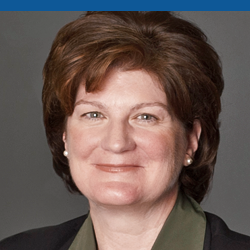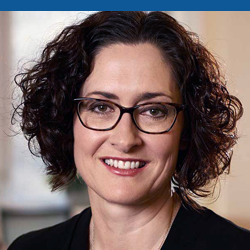ESG Roundtable
As the fight against climate change grows more urgent, demand for sustainable investments is surging. ICI sits down with experts in sustainable investing—to talk about the fund industry’s vital role, the regulatory environment, and the prospects for a common global framework for public company disclosure.
In recent years, few policy issues have been more important than those involving sustainability—or ESG [environmental, social, and governance]—investing. Not just for the regulated fund industry, but for the corporate world, the economy, and society more broadly.
We’re going to look in-depth at some of these issues later in this session, but let’s begin by zooming out. Why has the fund industry been focusing so sharply on climate-related issues?
John: At its heart, the industry’s focus on these issues has been very much investor-driven. Investors across the world—both retail and institutional—have been increasingly concerned about the financial risks that climate change poses and increasingly interested in the potential market opportunities it could create. Many are also grasping the urgency of the larger socioeconomic and environmental problems associated with climate change, and looking to direct their capital in response.
Amy: Right. Many investors now realize that climate risk is indeed investment risk—that companies face substantial physical and transition risk as the world forges ahead toward a lower-carbon economy.
Our industry’s focus on climate-related issues centers on helping our investors make more informed decisions in this area, whatever may be driving these decisions. We’ve become a valuable partner in the journey toward a lower-carbon economy—in large part because we meet investors where they are, and are able to work with investors who are approaching the journey in many different ways.
Karla: In the boardroom, we’re seeing the same growth in investor interest, but from a different perspective. And for many independent directors—myself included—the surge has reshaped our workload.
We’ve become far more involved in ESG issues, including through discussions with management, and are spending a lot more time educating ourselves on them. How ESG factors are incorporated into the investment process, how the compliance team may be involved and what they’re focused on, how disclosures are prepared—those types of things. Even directors at firms that don’t have any ESG-focused products are educating themselves, because the firms are still incorporating ESG factors into investment risk analyses.
With ICI’s leadership and support, the industry has done fantastic work explaining the key ESG terms, and ensuring that fund investors understand their options. The industry must continue building on this work going forward.
—Karla Rabusch
The growth in investor interest—it’s about more than just moving capital to sustainability leaders.
John: Very much so, and our firm is a prime example. In their desire to help foster positive change, our clients also want to take part in our engagement—where we, with the power of our shareholders, identify an opportunity for a company to improve. An improvement that we think would be good for employees, communities, or the environment, for example, and that would also enhance the company’s long-term financial value.
Amy: Same here. Our clients are more interested in using their influence than they ever have been. This growing interest has made us more disciplined in focusing our stewardship activities on specific, meaningful issues, rather than having 200 conversations with companies about any number of generic items. It’s also another example of why firms need robust climate-related information from the companies in which they invest.
This information remains highly fragmented, though, doesn’t it?
Amy: It does. Voluntary initiatives for public company disclosure have road tested a range of climate-related metrics for some time now. These initiatives have proven to be a good starting point, but there remains quite a bit of inconsistency and incomparability across regions. As global firms—with global clients who invest in global companies—we need metrics that transcend all borders.
Dorothy: I would add that, from the US perspective, the SEC hasn’t updated its regulatory framework around public company disclosure of climate-related information since 2010. A lot of the information that public companies do provide is boilerplate, and investors are looking for—and need—information that is much richer, much more detailed than that.
Many have lauded the progress made by those voluntary initiatives for public company disclosure. But mandatory climate-related disclosure from public companies is garnering more and more support in the policymaking community, as well as in industry circles. What’s the sensible role for policymakers here?
John: Well, the need for reliable, high-quality information from public companies is nothing if not urgent, and regulators must play a role in ensuring that companies provide it. The world has changed so much since 2010, and we can’t continue relying on regulatory guidance from more than a decade ago.
But simply requiring “more disclosure,” so to speak, isn’t enough. It’s critical that investors have data that they can trust—that they can be confident in the knowledge that companies are gathering and disclosing these data in a rigorous, comparable, consistent way. My hope is that regulators make this a priority.
Amy: We must also remember that this isn’t solely a backward-looking proposition. For example, information on companies’ greenhouse gas emissions over a recent period are important—no question. But forward-looking information—how companies are preparing to do business in a lower-carbon economy, the targets they’re setting and how they’re setting them, for instance—that information will perhaps be more important in determining a company’s enterprise value in the years ahead.
Of course, this forward-looking information is highly variable, and not often easy to quantify. So, regulators will have much to consider as they work to figure out how companies should be disclosing it.
Well, as the SEC prepares its new climate disclosure requirements for public companies, we know that all of that information—both backward- and forward-looking—is on the table. What are you looking for in the SEC’s proposal?
Dorothy: One of the biggest questions here is what to do about Scope 3 emissions under the Greenhouse Gas Protocol. That is, should the Commission require that public companies disclose them? We all know that Scope 1 and 2—the emissions generally associated with a company’s own activities—are fairly easy for companies to track. ICI supports mandatory disclosure of these emissions, as do many of our members.
But Scope 3—these are the emissions associated with a company’s supply chain, as well as its products and services. That’s a whole different ballgame. And you really have to wonder whether companies would even be able to provide Scope 3 data of the quality that investors would need.
John: You really do. Look, I’d love to see companies get there. But at this point, many companies lack a proven, reliable method to calculate and report Scope 3 emissions. I would encourage the SEC to recognize this and lay out a plan going forward, rather than simply mandating disclosure of data that may be of low-quality and unable to provide investors with meaningful information.
Karla: I would agree. In the boardroom, we’re always thinking about how complex information can be provided in a way that fund investors can understand—that they find meaningful. Is that possible with Scope 3 emissions today? I’m not so sure.
Dorothy: Nor am I. But I do know one thing: if the SEC were to require Scope 3 disclosure from public companies, the data quality won’t be great at the outset, and it will take time to figure out how to improve the quality.
It’s certainly a spirited debate—and one of many in this space. Another, of course, involves whether regulated funds are engaging in “greenwashing”—the practice of marketing yourself as more “green” or “sustainable” than you actually are. What’s your take on policymakers’ concerns here?
John: Well, any regulatory effort to create clarity in the market for sustainable investments—or to address issues that could undermine the market’s trust in fund products—is important for sure. If that is the ultimate aim, the time to act is now, when we are still early days in ESG-related policymaking. But the idea that there is some kind of industrywide problem—that would be inconsistent with my experience and observations over years of working in this space.
Amy: Another element of this—and you alluded to this earlier, Karla—is that ESG is not just for ESG funds anymore, and that’s where some confusion has come in. What I mean is, fund managers once used ESG criteria strictly to build ESG-focused products. But increasingly, fund managers are incorporating ESG analysis into a much wider range of portfolios, even those not marketed as ESG funds. So I think that, as an industry, it behooves us to recognize this new reality—and to make sure that there is never any doubt about why, when, and how we use terms like “ESG,” “green,” or “sustainable.”
Karla: Absolutely. For many everyday retail investors, the terms can be a lot to get your head around in the beginning. Exclusionary, inclusionary, integration, impact, tilting—they’re not exactly household names.
But with ICI’s leadership and support, the industry has done fantastic work explaining the key ESG terms, and ensuring that fund investors understand their options. The industry must continue building on this work going forward.
Dorothy: Yes. For all the progress in recent years, there remains plenty of work to do. We absolutely need better disclosure for the benefit of retail investors. But regulatory solutions so far haven’t had a lot of success toward that end. Market-based solutions can of course be more flexible and driven more by the people who are the most knowledgeable, but they aren’t perfect either.
It’s going to take a herculean effort to get to a place where every retail investor fully understands what fund firms are trying to communicate, which is essentially how they work this nonfinancial information into the investment process. That’s going to be one of the hardest parts of all this—bridging the gap from practitioner speak to the language of everyday people.
Karla: Exactly. I mean, even conventional investment information can be quite complex. But for ESG—even after the work that firms do to gather information from dozens if not hundreds of issuers, evaluate it, consolidate it, and shape it into something meaningful for retail investors—just the nature of the information ramps the complexity up to a whole other level.
We spoke earlier a bit about the need for climate-related information on a global scale, and before we wrap up, I’d like to explore that more deeply.
We are seeing growing momentum toward a common global framework of standards for public company disclosure of this information. Certainly, there are numerous challenges to developing and maintaining a framework of this type, but some say that doing so is essential to facilitating the transition to a lower-carbon economy. Do you think that such a framework is worth pursuing?
John: My sense is that this will be a difficult mission to conquer. For me, the question is: is the overall global system mature enough to attempt to develop a common means of calculating and reporting sustainability information. I, for one, think that we’re still pretty immature.
Don’t get me wrong—I love the idea of having a global conversation about this. But in pursuit of a common global framework, we must be careful not to halt innovation and competition in this area, which have been central to producing some of the robust standard sets that are in place today. If a framework could be constructed in a way that allows for significant additional development and innovation on top of what we already have, then I do think it could be useful.
Amy: I do feel that sustainability disclosure needs to align better across jurisdictions. In recent years, we’ve been dealing with initiative overload—standard overload. It seems there has been a tendency of “the more initiatives, the better.” And I think that will continue to be a source of frustration for investors and companies alike if we just continue on the way we’re going.
So, I do applaud the efforts of those who are trying to move us toward greater consistency. I try to be an optimist in this area, and I do think a common global framework is within reach. The challenge is just that it’s going to take quite a while to develop, and we need it as soon as possible.



